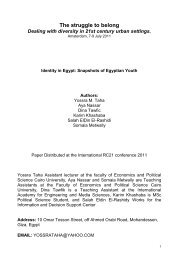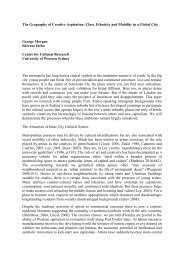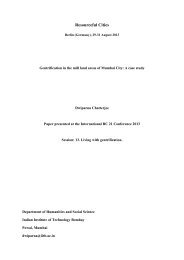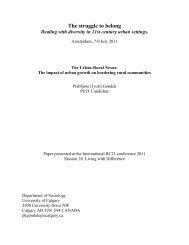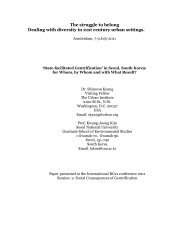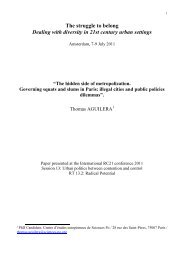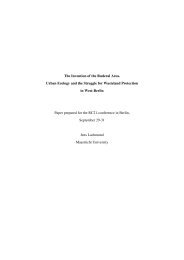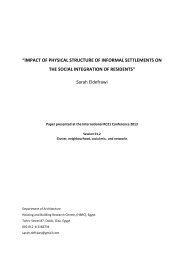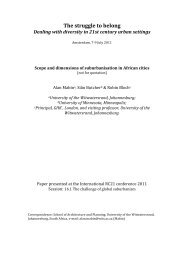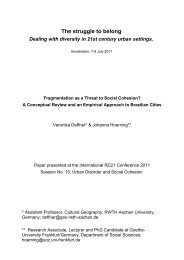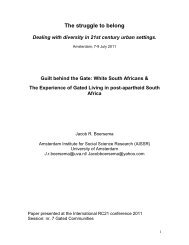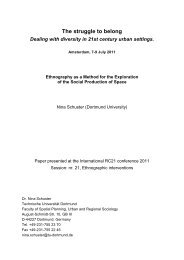Gentrification as a broad process of reurbanization - RC21 ORG ...
Gentrification as a broad process of reurbanization - RC21 ORG ...
Gentrification as a broad process of reurbanization - RC21 ORG ...
Create successful ePaper yourself
Turn your PDF publications into a flip-book with our unique Google optimized e-Paper software.
Judit Veres CEU Budapest<br />
approaching social <strong>process</strong>es <strong>as</strong> co-constituted by cultural, political and economic<br />
<strong>process</strong>es quite inspiring and helpful to my endeavor.<br />
In this paper I propose to look at the historical emergence <strong>of</strong> one particular urban<br />
cultural space known <strong>as</strong> Trafó, at the sociopolitical ideologies and economic forces<br />
involved in its production, including the role played by cultural entrepreneurs, state<br />
<strong>of</strong>ficials in its formation, the social use <strong>of</strong> the place, and its <strong>as</strong>sociated symbolic and<br />
affective meanings.<br />
Contrary to widespread <strong>as</strong>sumptions about the hollowing out <strong>of</strong> and the demise <strong>of</strong> the<br />
state, Trafó‘s history presents a more nuanced and dynamic picture <strong>of</strong> a continuously<br />
evolving relationship between state and capital and society. I start from the idea that<br />
― actually existing socialism and welfare systems in the West should be conceived not<br />
<strong>as</strong> fundamentally different social formations but <strong>as</strong> importantly different variations <strong>of</strong><br />
the general state-interventionist form <strong>of</strong> twentieth century world capitalism‖ (Moishe<br />
Postone, 1993) A far from monolithic or static post-socialist state h<strong>as</strong> emerged out <strong>of</strong><br />
the socialist state, one that h<strong>as</strong> variously steered and intervened in the movement <strong>of</strong><br />
capital, but in a way that best served the interests <strong>of</strong> the always dominant political<br />
parties. The changes <strong>of</strong> the Hungarian socialist state into a neo-liberal capitalist state<br />
show that the state does not vanish, but that its main logic transforms, and those parts<br />
that are thought to strengthen it dominate the political <strong>process</strong>. The recent debates on<br />
and changes in governing in the wake <strong>of</strong> the 2010 elections need to be seen in light <strong>of</strong><br />
this and that the new modes <strong>of</strong> neoliberal governances are not, by far, more<br />
democratic or participatory but seem to point to more exclusionary, authoritarian and<br />
intransparent political structures, actor-constellations and policy-making.<br />
No alternatives and independents in the new urban politics after the 2010 elections?<br />
‘ When the Alliance <strong>of</strong> Free Democrats took over cultural politics twenty years ago<br />
they turned the order <strong>of</strong> values on their head and with this they caused unbelievable<br />
destruction. The t<strong>as</strong>k <strong>of</strong> the current government is to turn the order <strong>of</strong> values back on<br />
their feet’. (Iván Markó, Magyar Hírlap)<br />
This remark by one <strong>of</strong> courtiers to the current right wing establishment, and who is<br />
rumoured to get Trafo, w<strong>as</strong> made apropos <strong>of</strong> the looming changes with respect to<br />
5




